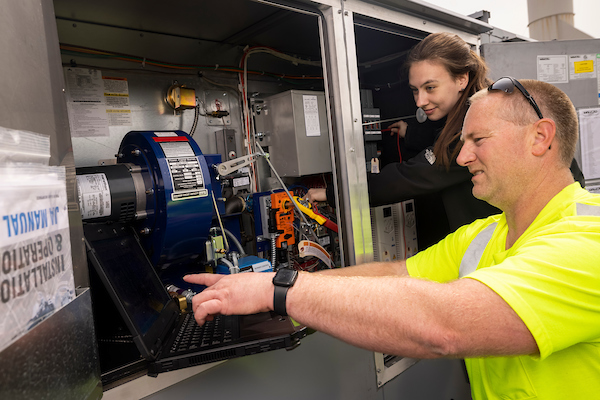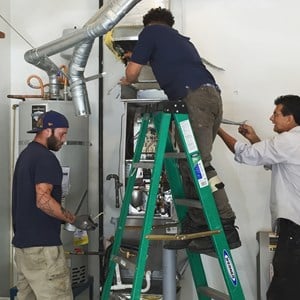Quick Facts Summary Table
| Category |
Details |
| Average Annual Salary |
$62,141, with potential hourly rates up to $37.90 |
| Specialized Roles |
HVAC Technicians earn up to $52.44/hour |
| Job Growth Outlook |
Stable with infrastructure investment and sustainable energy push |
| Education Requirements |
High school diploma, vocational training or apprenticeships |
| Training Duration |
Apprenticeships typically last 4-5 years |
| Major Local Projects |
$1.55-$1.6 billion Seattle Transportation Levy for road, bridge and transit improvements |
| Apprenticeship Providers |
UA Local 32, King County Apprenticeships |
Understanding Mechanical Trade Careers in Seattle
Seattle, WA, presents exciting opportunities for those interested in mechanical trade careers. By 2025, the city is experiencing high demand for mechanical trade workers, driven by significant infrastructure projects, a commitment to sustainability and clean energy, and a robust construction and manufacturing sector1. These trades involve installation, repair, and maintenance of mechanical systems in construction and industry.

Qualifications and Training Programs
To start a career in mechanical trades in Seattle, individuals typically need to complete specific education and training:
-
High School Diploma or GED: This is the foundational requirement for most mechanical trade roles including automotive service technicians and welders2.
-
Vocational/Technical Education: Many trades like HVAC require additional coursework with associate degree or certificate programs2.

-
Local Apprenticeships:
- UA Local 32 offers comprehensive programs in plumbing, pipefitting, HVAC and refrigeration with expert training3.
- King County Apprenticeships provide hands-on experience through programs like the Metro Building Operating Engineer (BOE) with extensive on-the-job learning4.
-
Skilled Trades Pathway: Seattle Public Schools offers students a path with courses and activities through Skills USA to prepare for trade careers2.
-
Industry-Specific Training: Organizations like the Construction Industry Training Council of Washington provide specialized training for mechanical insulators and related trades5.
Career Prospects and Salary Expectations
Seattle offers competitive salaries for mechanical trade positions with annual incomes ranging from $57,000 to $113,0006. The average for skilled trades reaches $62,141, with hourly rates up to $37.90, including higher wages for HVAC specialists at $52.44/hour523. Compared to other U.S. cities, Seattle's competitive compensation is balanced against a high cost of living, making the region a strong contender for mechanical trade professionals.
For context, nationwide, electricians are expected to see 9% employment growth, and plumbers 5% growth from 2023 to 20337. While energy-related mechanical trades in Seattle may see slower local growth, the overall mechanical trade job market remains stable due to ongoing construction activity and sustainable building initiatives.
Technological Impact and Future Opportunities
Innovation is changing how mechanical trades are practiced. Smart building technology and automation are driving new specialized roles within the mechanical trades in Seattle. With sustainability and clean energy initiatives1, opportunities are opening in green technology and energy-efficient systems. These advancements may lead to higher wages as the complexity of mechanical trade work increases due to technological demands, offering promising career paths for those adapting to new tools and methods.
Infrastructure Projects Driving Mechanical Trade Opportunities
Infrastructure developments play a critical role in the growth of Seattle's mechanical trade jobs. Major investments like the Seattle Transportation Levy of $1.55–1.6 billion support essential projects such as sidewalk construction, road paving, bridge repairs, and improved transit connections37. These projects generate demand for skilled mechanical professionals in areas like plumbing, electrical work, and HVAC. Additionally, these initiatives contribute to economic growth and enhance the region's appeal for businesses and residents, further driving trade opportunities.

For context, in 2020, the Seattle metropolitan area had 55,009 general construction jobs, 28,150 energy-related construction roles, and 33,002 jobs in building operations2, showcasing the significant contribution of construction sectors to mechanical trade opportunities.
Breaking Barriers to Career Entry
For underrepresented groups, access to mechanical trade careers can be challenging. Common obstacles include limited access to education in underserved areas, financial hurdles in acquiring needed tools, and a lack of mentorship opportunities53. However, Seattle offers programs to break down barriers:
- Washington Jobs Initiative offers pre-apprenticeship and boot camp programs for underrepresented individuals53.
- The Port of Seattle promotes diversity through targeted outreach and inclusion in apprenticeship programs34.
These programs aim to increase representation and provide equitable opportunities for all interested in joining the mechanical trade workforce.
Your Next Step in a Mechanical Trade Career
If you're considering a career in mechanical trades in Seattle, WA, there has never been a better time to start. With a projected stable job market, competitive salaries, and numerous training programs, mechanical trades offer strong career potential.
To begin your journey toward becoming a mechanical trade professional in Seattle, explore mechanical jobs in Seattle, WA, with Gild. Whether you're starting fresh or looking to advance, these apprenticeship opportunities provide a solid foundation for your career in the skilled trades.
Explore entry-level trade jobs in Seattle on Gild
For those seeking to develop their skills further, additional training opportunities are available through Washington State Apprenticeship and Training Council programs.
Discover how the Washington Job Initiative expands access to trades
Sources

